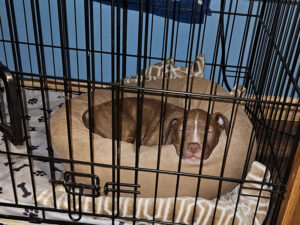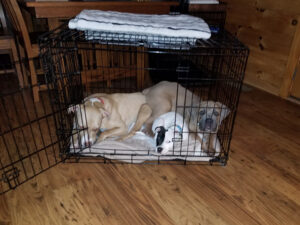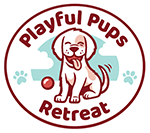Written by Maria Stouffer, CPDT – Training Director at Playful Pups Retreat and Owner of Full Potential Dog Training
 We are continuing our Playful Pups Retreat “A to Z” in dog training series with information on the importance of using a kennel/crate for your dog. Often in my private training sessions and in my puppy manners classes, I often will ask the question whether the dog is crate or kennel trained. Typical responses I receive are:
We are continuing our Playful Pups Retreat “A to Z” in dog training series with information on the importance of using a kennel/crate for your dog. Often in my private training sessions and in my puppy manners classes, I often will ask the question whether the dog is crate or kennel trained. Typical responses I receive are:
- Yes, but only at night, they are fine during the day.
- No, I think it is cruel to kennel a dog. My dog screams and cries.
- I did when he/she was a puppy, but they seem good to be out of the crate now.
- No because I don’t want the dog to feel like it is a punishment.
I want to address all of these and share my philosophy and industry responses on crate (kennel) training. First and foremost, the crate/kennel is a safe place for your puppy or dog to be when you can’t watch or be with them, at any age.
House training: When you bring a new puppy into your home the number one thing you want to do it present the puppy with the appropriate door location to go outside and potty. Many of these pups are very young and in those short 8 weeks, most likely didn’t have a set designated area to go out and potty so they just went anywhere they wanted too. To no fault of the breeder or shelter caring for the dog, there just wasn’t the time or ability to work on potty training. Once your new dog is home it is likely they will have a few accidents in the house, it’s not the dog’s fault, nor yours for that matter, but it can become extremely problematic if we don’t handle it. Make sure you carve out crate time in the beginning for the dog for when you can’t monitor them. A crate/kennel is the safest way to protect your pets when you can’t be with them, and generally dogs don’t like to go potty where they sleep. It will help them begin to learn how to hold their bladder and bowel.
 Crates/kennels are like dens: In the wild, dogs would find den like areas to hide and sleep in for protection and warmth. Crates/kennels can and should be a safe warm place where the dog feels comfortable going, either when they need a break from something or they are asked to go there for bed/nap time. This is also a great tool to use when establishing a dog’s schedule, even if you are home. Schedules help dogs settle into a routine and a crate time can be very helpful in that.
Crates/kennels are like dens: In the wild, dogs would find den like areas to hide and sleep in for protection and warmth. Crates/kennels can and should be a safe warm place where the dog feels comfortable going, either when they need a break from something or they are asked to go there for bed/nap time. This is also a great tool to use when establishing a dog’s schedule, even if you are home. Schedules help dogs settle into a routine and a crate time can be very helpful in that.
Punishment: A crate/kennel should never be used to punish a dog. We create punishment through our frustration levels, tone of voice and the way we put the dog into their crate. If you find yourself frustrated or needing a break from your sweet pup, quietly lead the dog to the crate. I suggest not speaking to or looking at them, place them in the crate, calmly shut the door and walk away. Use this as a time out method to allow the dog to settle down and reset their brain before allowing them to come out. Before releasing the dog, it is important for them to learn that they must be in a good state of mind to come out of the crate. When they are relaxed and quiet, calmly walk to the crate, with no talking or eye contact, and open the door and walk away. Allow the dog to come out on their own and see if things have changed. Sometimes, depending on the behavior, this may need repeated.
My dog cries and screams when in the crate/kennel: It is important to create a positive environment every time the dog goes in the crate/kennel. I know this may be easier said than done, but with time and patience it does work. As mentioned above, when the dog is calm and relaxed, then and only then, would it be the appropriate time to open the door and allow them to come out of the crate. Start out slowly and help the dog associate good things when going into their crate. Feeding meals, or providing special treats will help to establish a positive association with their crate. A good idea is to fill a bone or kong toy with peanut butter or pumpkin, and freeze it, give it to them to enjoy in their crate. At times, don’t shut the door right away and allow them to go in and get a yummy treat and come right back out.
Patience is the key when using the crate/kennel. Our team of skilled dog trainers at Playful Pups Retreat is here to help busy pet parents through this process. If you have a new puppy, our Puppy Social Skills daycare program teaches many important life skills, including crate and potty training. For recently adopted adolescent or adult dogs we offer several training options including our A to Z Day Training program. Our team is available to provide guidance on which of our many dog training options will be the best fit for your pup. Give us a call to learn more!
